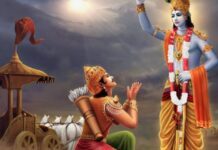श्लोक 17 – Verse 17
उत्तमः पुरुषस्त्वन्यः परमात्मेत्युदाहृतः।यो लोकत्रयमाविश्य बिभर्त्यव्यय ईश्वरः।।15.17।।
uttamaḥ puruṣhas tv anyaḥ paramātmety udāhṛitaḥ
yo loka-trayam āviśhya bibharty avyaya īśhvaraḥ
शब्दों का अर्थ
uttamaḥ—the Supreme; puruṣhaḥ—Divine Personality; tu—but; anyaḥ—besides; parama-ātmā—the Supreme Soul; iti—thus; udāhṛitaḥ—is said; yaḥ—who; loka trayam—the three worlds; āviśhya—enters; bibharti—supports; avyayaḥ—indestructible; īśhvaraḥ—the controller
Translations by Teachers (आचार्यो द्वारा अनुवाद):
Swami Ramsukhdas (Hindi)
।।15.17।।उत्तम पुरुष तो अन्य ही है, जो परमात्मा नामसे कहा गया है। वही अविनाशी ईश्वर तीनों लोकोंमें प्रविष्ट होकर सबका भरण-पोषण करता है।
Swami Tejomayananda (Hindi)
।।15.17।। परन्तु उत्तम पुरुष अन्य ही है, जो परमात्मा कहलाता है और जो तीनों लोकों में प्रवेश करके सबका धारण करने वाला अव्यय ईश्वर है।।
Swami Adidevananda (English)
There is a Supreme Person other than these. He is referred to as the Supreme Self (Paramatma) in all the Vedas. He, as the Immutable One and the Lord, enters the threefold world and supports it.
Swami Gambirananda (English)
But the Supreme Person is different; He is spoken of as the transcendental Self, permeating the three worlds and upholding them, and He is the imperishable God.
Swami Sivananda (English)
But distinct is the Supreme Purusha, called the highest Self, indestructible and Lord, who pervades the three worlds and sustains them.
Dr. S. Sankaranarayan (English)
But the Highest Person, distinct from both [this], is spoken of as the Supreme Self, which, being the changeless Lord, sustains the triad of the world by entering into it.
Shri Purohit Swami (English)
But I am higher than all, the Supreme God, the Absolute Self, the Eternal Lord, who pervades and upholds all the worlds.



